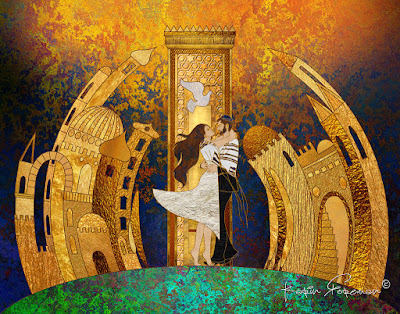We are on the second day of Sukkot. At first I am puzzled by the verse I will only paraphrase where God says, "You will live in booths seven days that in the future you may tell your children I commanded you to live in booths." It has that circular logic which is all over the Bible, or even that non logic. It sounds literary but doesn't seem to mean much. It is much like God's arbitrary commands to weave to types of fabric together--which makes it stronger--or not put a razor to your face, or not eat shellfish, followed by, "For I am holy says the Lord."
Somewhere along the first or second day I stumble upon the blessing, "May the Lord protect you under the Sukka of his wings," and across the other verse, "That you may tell your children you dwelt in booths... not for seven days, but for forty years. This is called the Festival of Booths, or sometimes the Festival of Tabernacles, because this is how Sukka has been translated, and because God himself lives in a Tabernacle for hundreds of years, but the correct translation should be just what we call it, Sukka, Sukkot, Sukkoth, and Sukkot means Shelter. I am convinced that what the verse should really say is, Tell your children you dwelt under my shelter for forty years." In one sense, I suppose you could say they dwelt in tents, and they did, but the Hebrew word for tent is ohel. Figuratively ohel and sukka are one, and the putting on of the tallit signifies the shelter of God, but what we are celebrating is not only that once upon a time people who now live in houses were nomads, but that these people were under the tender care of God, and we are under that care too. For seven days, the fragile house or whatever we can do to commorate that fragile house reminds us of the fragility of all things and how ,at the heart of everything is the tender mercy and shelter of the Divine One.
The Jewish liturgy is magic. It is a different magic than the Christian one, both serve the Craft is different ways. In some ways the Siddur is more magical, what with the words read and sung and swayed to but nos spoken in a vernacular so that you only understand a little of what you are saying, even when you do understand. You move into emotion and beyond emotion, anc cross over into another realm.
This cold and rainy, sunless time we are having could be called a Little Winter or maybe a Little Fall. It is the beginning of those seasonal changes where you move from the heat to the cold thinking someone is her for good, though after a week or so, the weather has completely changed. It makes it hard to know what to where, or to believe in the very real phenonenom of the global warming.
The house is decorated with lights. There is no building Sukkah and eating outside in this part of the country. That is a punishment more than a festival. So for the first time, as the weather is gloomy and cold and saps the strength from bones and the will from flesh. We celebrate. We chant the hypnotic, hand clapping, vody swaing Hallal everyday and recount he goodness of God every morning. We eat festival foods and sleep under the fairy lights that represent the stars and perhsps represent the inner light and the constant providence of God.

No comments:
Post a Comment